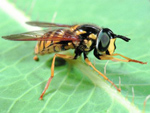This week's gardening tips
Throughout August, the most vulnerable fruits to wasps are plums and figs and it's also time to cut back the old fruiting canes of your summer raspberries


Wasps
Wasps are useful in the spring and early summer as they eat garden pests, but this is easily forgotten when their food sources are no longer around and they start on your fruit. We’ve not had much success when we’ve put traps near our bushes to protect the fruit, as the fruit is more of a draw than the syrup in the traps. Through August, the most vulnerable fruits are plums, figs and mulberries, so remember to be very careful when picking them, in order to avoid stings.
Raspberries
Cut back the old fruiting canes of your summer raspberries almost to the ground, to make way for next year’s, but take care not to damage the new ones as you do so. Keep only the strongest new canes, and not more than six to nine per plant; remove all the thinnest ones to avoid overcrowding. Tie them to your supports you won’t need to feed them if they’re near the height you want, as anything over 6ft will have to be trimmed down in the winter to prevent wind damage. It’s not a bad idea to mulch them, however, in order to retain the moisture. Raspberries will continue to fruit for eight or nine years, but replace old plants with new stock. New varieties are being bred with better disease resistance a bonus for the organic garden.
Hedges
If you leave trimming your hedges until August, you’ll keep that just-cut look for the rest of the year, as it’s now late enough for the plant not to re-shoot except privet, of course. Dwarf box and other such small-leaved evergreens have to be cut with very sharp shears or electric hedge trimmers, as you will be cutting through a lot of leaves; blunt blades chew the leaves and their edges turn brown. Don’t cut on very hot days as the sun will scorch the newly exposed leaves. It helps to spray the hedge afterwards ideally with rainwater. It’s a good time to trim your yews, but be sure that you’re only cutting off this year’s growth; if you cut into the old wood, it won’t shoot until next year. If it’s practical, prune and shape the stems of your larger-leaved evergreens, such as bay and laurel, with secateurs, for a neater finish.
Herb cuttings
Sign up for the Country Life Newsletter
Exquisite houses, the beauty of Nature, and how to get the most from your life, straight to your inbox.
Now is a good time to take cuttings of shrubby herbs, such as rosemary, sage and thyme. Plant a few freshly picked tips into a 3in pot and keep in a mist propagator, or, if you don’t have one, cover with a plastic bag pierced with a few holes, then leave in a well-lit spot, but out of direct sunlight. If you replace your herbs every few years, you will keep them vigorous. Creeping thymes root as they spread propagate by digging up the new growth from the plant’s edges with a trowel, pot and keep out of the full sun while they root into the compost. Philip Maddison is head gardener at Harrington Hall, Lincolnshire (www.harringtonhallgardens.co.uk)
Country Life is unlike any other magazine: the only glossy weekly on the newsstand and the only magazine that has been guest-edited by HRH The King not once, but twice. It is a celebration of modern rural life and all its diverse joys and pleasures — that was first published in Queen Victoria's Diamond Jubilee year. Our eclectic mixture of witty and informative content — from the most up-to-date property news and commentary and a coveted glimpse inside some of the UK's best houses and gardens, to gardening, the arts and interior design, written by experts in their field — still cannot be found in print or online, anywhere else.
-
 Six rural properties with space, charm and endless views, as seen in Country Life
Six rural properties with space, charm and endless views, as seen in Country LifeWe take a look at some of the best houses to come to the market via Country Life in the past week.
By Toby Keel
-
 Exploring the countryside is essential for our wellbeing, but Right to Roam is going backwards
Exploring the countryside is essential for our wellbeing, but Right to Roam is going backwardsCampaigners in England often point to Scotland as an example of how brilliantly Right to Roam works, but it's not all it's cracked up to be, says Patrick Galbraith.
By Patrick Galbraith